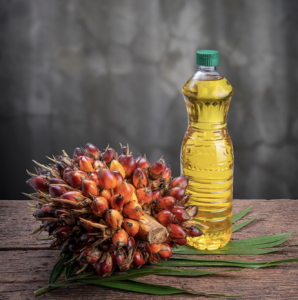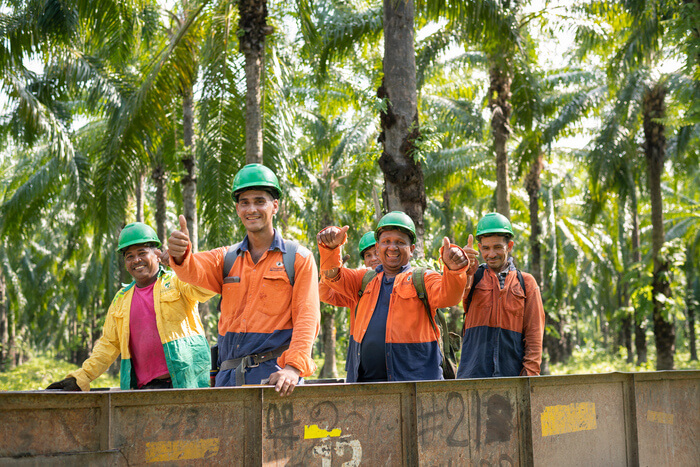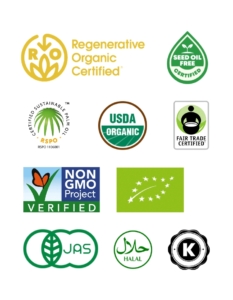Why Carbon Neutral Palm Oil Is the Standard for Ethical Sourcing

Carbon neutral palm oil balances the carbon emitted during its production with an equivalent amount of carbon removal—setting a new, responsible standard for the industry. This is sustainability in action, verified and transparent.
For food, beauty, and personal care brands, this accountability is urgent. Consumers want proof, not promises, and regulations like the EU Deforestation Regulation and Scope 3 emissions reporting demand full transparency. Brands can’t afford greenwashing—they need partners who lead.
That’s where DAABON leads with integrity. Instead of making lofty claims, DAABON provides verified carbon neutral palm oil backed by a suite of the world’s most trusted certifications, including Regenerative Organic Certified®, Fair Trade USA, and RSPO.
As buyers demand palm oil that is deforestation-free and transparently sourced, DAABON’s model offers proven accountability. This commitment is why DAABON is “Ranked #1 worldwide in transparency in the palm oil sector on SPOTT, a ZLS Conservation Initiative.”
With DAABON, verified sustainability isn’t just an option—it’s the standard.
Palm Oil’s Carbon Footprint: Why It’s Under Scrutiny
Palm oil is everywhere—but not always for the right reasons. It’s in over half of all packaged foods and personal care items. But it’s often associated with deforestation, biodiversity loss, and excessive carbon emissions.
That’s why regulators and conscious consumers are demanding change. The EU now requires proof that palm oil is deforestation-free. Scope 3 emissions rules push companies to track climate impacts across their supply chains. Falling short could mean fines, reputational damage, or lost access to key markets.
To lead in sustainability, brands must understand how carbon footprints are measured. The gold standard is Life Cycle Assessment (LCA)—a method that calculates emissions from every stage: farming, processing, transport, and product use. DAABON applies this approach to ensure their palm oil is produced with environmental integrity.
Here’s how carbon impact is classified:
- Carbon-positive: Adds more carbon to the atmosphere than it removes.
- Carbon neutral: Balances emissions with an equivalent amount of carbon removal.
- Carbon-negative: Removes more carbon than it emits.
These aren’t just technical terms. They affect your ESG scores, investor relations, and brand loyalty. Choosing verified carbon neutral suppliers like DAABON can strengthen your supply chain resilience and climate positioning.
Understanding the math is step one. The next is selecting partners who have already done the work—with data, certifications, and results to show for it.
DAABON’s Carbon Neutral Milestone: Verified Transparency in Action
 DAABON has achieved a pivotal milestone in the palm oil industry: verified carbon neutrality. While others make promises, DAABON delivers proof, demonstrating that responsible palm oil production can balance its carbon footprint today.
DAABON has achieved a pivotal milestone in the palm oil industry: verified carbon neutrality. While others make promises, DAABON delivers proof, demonstrating that responsible palm oil production can balance its carbon footprint today.
This isn’t a marketing claim; it’s a fact grounded in science. DAABON conducts a rigorous Life Cycle Assessment (LCA) following ISO 14067 standards. This framework allows for transparent carbon accounting, tracking every impact across the entire production chain.
While many producers are still working to reduce emissions, DAABON’s model is designed for balance. This commitment to transparently managing its environmental impact is a key reason why DAABON is “Ranked #1 worldwide in transparency in the palm oil sector on SPOTT, a ZLS Conservation Initiative.”
This achievement confirms that sustainable agriculture can be a key part of the climate solution. For brands, this offers a clear path forward with a partner that has already done the work.
Verified carbon neutrality isn’t a future goal. With DAABON, it’s a current, proven standard.
How DAABON Achieves Carbon Neutral Palm Oil
Achieving carbon neutrality starts with the soil. On DAABON’s farms, regenerative practices like minimal tillage and organic composting enrich the land, while conservation zones on DAABON’s estates protect biodiversity and support natural carbon cycles.
Every part of the land is managed to minimize its climate impact. Healthy, living soil holds more carbon, and native plants in protected areas boost ecological resilience. This is sustainability with roots—literally.
Beyond the fields, DAABON’s operations follow a closed-loop model. Biodigesters convert methane from organic waste into clean electricity, while leftover plant biomass fuels processing systems. This circular approach minimizes the need for fossil fuels and ensures that energy is created, not wasted.
Waste becomes power. Byproducts become nutrients. At every level, DAABON’s palm oil system is designed to reduce, reuse, and regenerate.
Emissions are tracked across the entire lifecycle using a verified Scope 1–2–3 framework:
- Scope 1: On-site emissions from farming and operations
- Scope 2: Purchased energy—already transitioned to renewables
- Scope 3: Emissions from suppliers, transport, and end use—measured and minimized through regenerative agriculture strategies
This is how carbon neutral palm oil becomes a reality—not through simple offsets, but through fundamental changes in how land is managed and energy is produced.
With DAABON, sustainability isn’t a label. It’s a living system—measured, managed, and proven.
Certifications That Validate DAABON’s Sustainable Palm Oil Practices
Claims of carbon neutrality mean nothing without proof. That’s why DAABON backs every claim with globally recognized certifications that address what responsible buyers care about most: environmental performance, ethical sourcing, and supply chain transparency.

DAABON’s commitment is verified by the world’s leading environmental and ethical bodies. These certifications aren’t just labels; they are rigorous systems of verification. Key certifications include:
- Regenerative Organic Certified® Gold: The highest standard for soil health, animal welfare, and social fairness.
- Fair Trade USA: Signals a deep investment in worker well-being and equitable community development.
- RSPO: Upholds the leading global standards for sustainable palm oil production.
- USDA Organic, EU Organic, & JAS (Japan Organic Standard)
- Non-GMO Project Verified
- Halal and Kosher
Together, these affirm DAABON’s position as a certified organic palm oil leader trusted by brands worldwide. In a marketplace clouded by greenwashing, DAABON provides clarity through standards that speak louder than slogans.
How B2B Brands Win with Transparent, Carbon Neutral Sourcing
Mere compliance is no longer the finish line. Verified transparency is the new standard. For forward-thinking brands, partnering with a supplier like DAABON—who provides verified carbon neutral palm oil—delivers a measurable, strategic edge.
By sourcing from DAABON, you don’t just reduce your supply chain risk; you build a brand narrative rooted in verifiable action. Instead of ambiguous claims, you get proof points that matter to customers, regulators, and investors: a verified carbon neutral status, top-tier certifications like Regenerative Organic Certified®, and the #1 global ranking for transparency on SPOTT.
And DAABON’s commitment doesn’t end there. Their strategic roadmap includes:
- Scaling sustainable and carbon neutral practices across additional farms and refineries.
- Investing in low-emission logistics to reduce Scope 3 transportation impacts.
- Supporting client decarbonization goals with verified data and proactive collaboration (learn how).
The future favors brands that go beyond compliance. With DAABON, you gain a sourcing partner who leads with integrity, science, and purpose.
In an era of climate accountability, transparent, responsible sourcing is no longer optional—it’s how category leaders are made.
Final Takeaway: Partnering with a Transparent, Carbon Neutral Supplier Strengthens Your ESG Strategy
DAABON’s verified carbon neutral palm oil is more than just a sustainable ingredient—it’s a commitment to transparency. It proves that palm oil can be produced responsibly, balancing its carbon footprint in a way that is scientifically validated.
For brands focused on ESG, this matters. It means measurable Scope 3 reductions, regulatory alignment, and a climate story that resonates with both investors and consumers. In today’s market, your sourcing strategy is part of your brand’s identity.
DAABON has already done the groundwork—investing in sustainable systems, verifying emissions data, and building a transparent, traceable supply chain. When you choose them, you’re sourcing more than palm oil. You’re embedding real climate leadership into your business.
Explore the data and next steps in DAABON’s full sustainability report or learn how brands are collaborating for climate-forward sourcing.
Lead with action. Source with integrity. Build a transparent supply chain—starting with verified carbon neutral palm oil.
